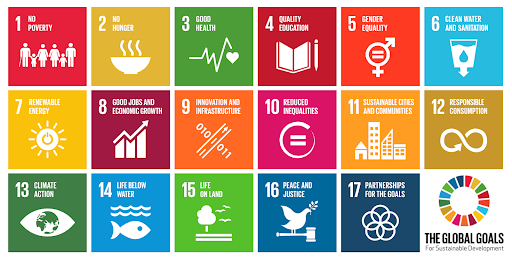Introduction
- The Sustainable Development Goals (SDGs) are officially known as Transforming our World: the 2030 Agenda for Sustainable Development.
- There are 17 goals and 169 targets to be achieved by 2030. The UN General Assembly (UNGA) adopted these goals in 2015.
- These goals are not legally binding.
Sustainable Development Goals (SDGs)

- Goal 1: End poverty in all its forms everywhere.
- Goal 2: End hunger, achieve food security and improved nutrition, and promote sustainable agriculture.
- Goal 3: Ensure healthy lives and promote well-being for all at all ages.
- Goal 4: Ensure inclusive and equitable quality education and promote lifelong learning opportunities for all.
- Goal 5: Achieve gender equality and empower all women and girls.
- Goal 6: Ensure availability and sustainable management of water and sanitation for all.
- Goal 7: Ensure access to affordable, reliable, sustainable, and modern energy for all.
- Goal 8: Promote sustained, inclusive and sustainable economic growth, full and productive employment and decent work for all.
- Goal 9: Build a resilient infrastructure, promote inclusive and sustainable industrialization and foster innovation.
- Goal 10: Reduce inequality within and among countries.
- Goal 11: Make cities and human settlements inclusive, safe, resilient and sustainable
- Goal 12: Ensure sustainable consumption and production patterns.
- Goal 13: Take urgent action to combat climate change and its impacts.
- Goal 14: Conserve and sustainably use the oceans, seas and marine resources for sustainable development.
- Goal 15: Protect, restore and promote sustainable use of terrestrial ecosystems, sustainably manage forests, combat desertification, and halt and reverse land degradation and halt biodiversity loss.
- Goal 16: Promote peaceful and inclusive societies for sustainable development, provide access to justice for all and build effective, accountable and inclusive institutions at all levels.
- Goal 17: Strengthen the means of implementation and revitalize the global partnership for sustainable development: finance, technology, capacity building, trade, policy and institutional coherence, data monitoring and accounting, etc.
Means of Implementation of SDGs
- The notion of ‘means of implementation’ describes the interdependent mix of financial resources, technology development and transfer, capacity-building, inclusive and equitable globalization and trade, regional integration, as well as the creation of a national enabling environment required to implement the new sustainable development agenda, particularly in developing countries.
- Sustainable Development Budgets: Governments will have to formulate Sustainable Development Budgets in order to implement Sustainable Development Goals.
- Access to Information: The development of policies that will promote open access to scientific data, especially legal issues that hinder access to scientific data are needed, along with the need for research funded by governments to be made accessible to the public.
- Technology Transfer: Foreign direct investment contributes towards financing sustained economic growth over the long term. It is especially important for its potential to transfer knowledge and technology.
 Profile
Profile Settings
Settings Refer your friends
Refer your friends Sign out
Sign out








